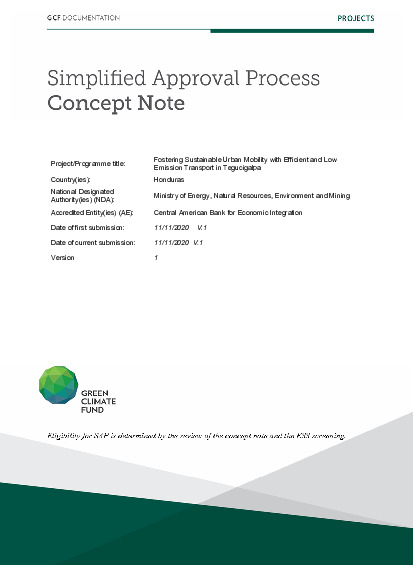Fostering Sustainable Urban Mobility with Efficient and Low Emission Transport in Tegucigalpa

Fostering Sustainable Urban Mobility with Efficient and Low Emission Transport in Tegucigalpa
1. In Honduras, road transport contributes with 43% of the GHG emissions produced by the energy sector, showing a steady growth in the last decade. In the NDC presented to the UNFCCC, the Government of Honduras (GoH) has pointed out the importance of the transport sector for the country's economy, so achieving its sustainability is one of the priorities at the national level.
2. The Fostering Sustainable Urban Mobility with Efficient and Low Emission Transport project objective is to set a standard to reduce GHG emissions produced in the transport sector, together with ancillary benefits such as improving the competitiveness of the city, revitalizing the public space, and showing a renewed perspective on how technology can help in fighting climate change. For this purpose, the project will create an enabling environment for low-carbon transport investment, together with a demonstrative component (pilot) to road test electric vehicles under the specific conditions of Tegucigalpa. This initiative will shed light in terms of the technical, economic, environmental and social requirements and steps to promote the decarbonization of urban public transport in Honduras. In this context, mobility is understood as a major investment driver that provides multiple co-benefits at the city level. The project will also favor public space improvement and integration with other transport modes, fostering the shift to better transport technology, avoiding trips that require infrastructure, capital allocations and additional GHG emissions, and improving existing transport services and infrastructure by facilitating the integration of transport and mobility subsystems. The proposed project will provide the GoH with information about the performance of electric buses under local conditions towards the development of an enabling environment for scaling up sustainable transport in the city, with potential replication in other parts of the country.
3. The Governmental Civic Center of Tegucigalpa (CCGT) is a building complex that that is expected to attract more than of 9,000 employees with an average of 1,795 visitors per day. The CCGT is located in Tegucigalpa in one of the most complex crossroads of the city in terms of congestion, air pollution and parking restrictions.
4. Based on the growing number of daily trips, transport infrastructure capacity, parking spaces, the CCGT provides an excellent opportunity to develop a pilot program to road test the potential integration of electric buses in the urban landscape together with an enabling environment for mobility investment under the right institutional architecture which are the two building blocks of this project.
5. The Honduran Institute of Land Transportation (IHTT), as the Executing Entity is developing a sustainable accessibility plan for the CCGT. This plan aims at integrating energy efficient and low-carbon mobility alternatives to private transportation for employees and users, together with the development of complementary infrastructure, including peripheral parking lots, pedestrian access, horizontal and vertical signaling, walkways, urban furniture designed for people with reduced mobility (PRM), last mile trip alternatives; together with an institutional design for the implementation of urban sustainable mobility. This plan is key in taking this project to the next level by expanding the perspective of mobility in the context of the CCGT to a more metropolitan approach in terms of mobility and urban planning that could result in a lower carbon footprint.
6. To achieve this objective the Honduran Institute of Land Transportation (IHTT), will work as the Executing Agency, with the support of the Natural Resources, Environment and Mines (MiAmbiente+) as the NDA. The Ministry of Energy (SEN) and the Government of Tegucigalpa, M.D.C. will have a role in terms of the institutional development required as well as the technical support in terms of making the project viable. Under this institutional arrangement the project has two main components that feed into the project objective:
7. a) To design and implement a pilot project to road test the performance of electric buses under local conditions, including the evaluation of operating costs, environmental and energy challenges, as well as public infrastructure and service maintenance requirements in Tegucigalpa.
8. b) To define an enabling environment that considers the technical, environmental, economic, social and regulatory aspects that lead to a transport and mobility system that integrates transport modes around the upgrade of massive transit systems using electric buses.